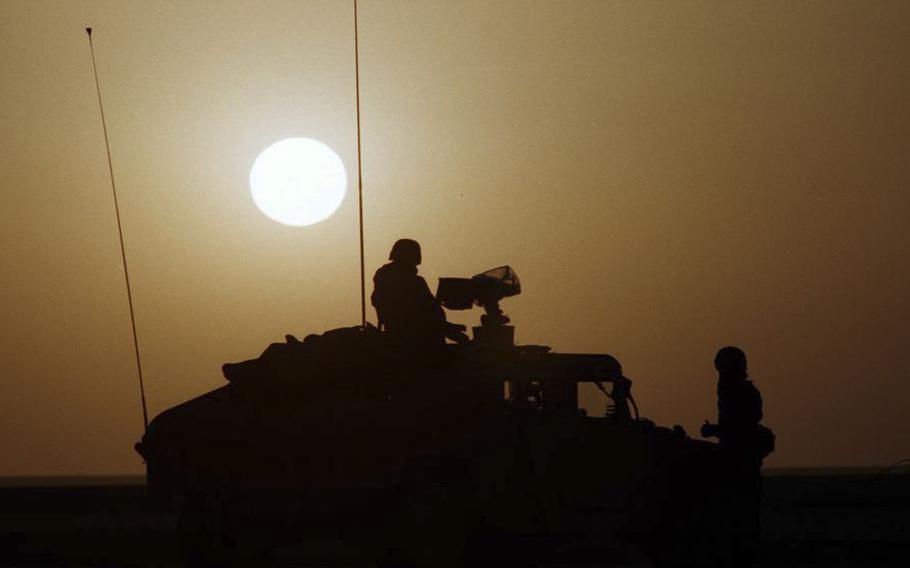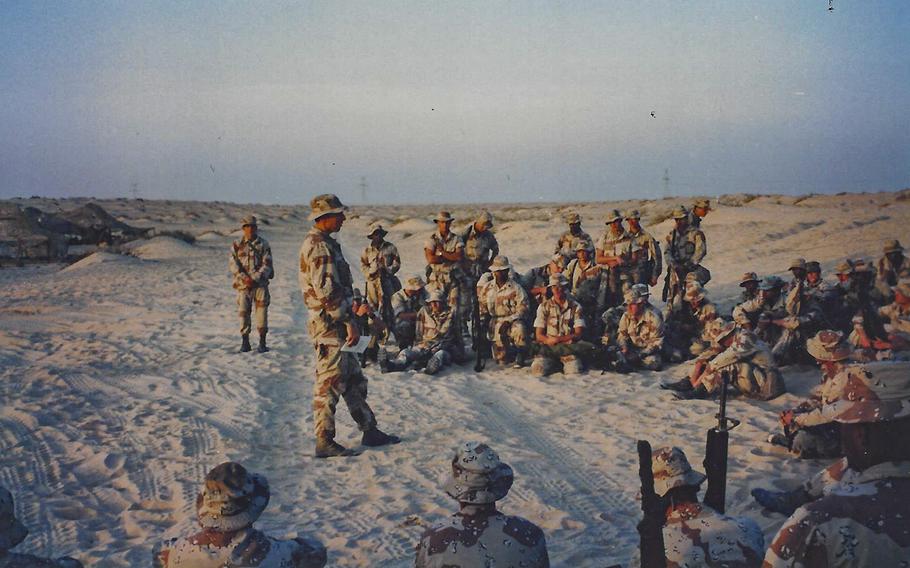
U.S. service members are silhouetted against the desert sun during the Gulf War. (Stars and Stripes)
(Tribune News Service) — Veterans from around the country tuned in online this week to a series of meetings hosted by a Department of Veterans Affairs panel on illnesses related to Gulf War duty, but chairs set up for local attendees at the Oahu Veterans Center were mostly empty.
One veteran who did show up told the Honolulu Star-Advertiser he was actually from Philadelphia and just happened to be in Hawaii on business.
Members of the VA’s Research Advisory Committee on Gulf War Veterans’ Illnesses said they had come to Oahu hoping to engage Hawaii’s veterans, who have not always been front of mind for policymakers in Washington, D.C.
“We’re trying to get out and reach the rural areas, “ said Bill Watts, a committee member and Gulf War veteran who flew in from Miami. Watts said there are as many as 29, 000 Gulf War veterans living in the islands.
“Now, Hawaii is a high-cost area ; maybe they didn’t show up because they had to work, “ he said.
But Research Advisory Committee Chair Dr. Cheryl Walker noted that the veterans who tuned in online for the meetings Tuesday, Wednesday and Thursday were very engaged.
“I was really happy that we have a lot of online participation, and I think that was really important, “ said Walker. “I hope that the veterans feel like we listened to them, because certainly there are many things on the final agenda that we were going to do that came directly from what the veterans said.”
Kirt Love, a Gulf War veteran and advocate who testified Thursday before the committee remotely from his home in Crawford, Texas, told the Star-Advertiser by phone that he was unable to attend in person because of the cost of traveling to Hawaii, and was frustrated the panel chose Oahu as the meeting place.
“I wanted to attend this meeting, “ he said. “I wanted to be at D.C., and I was geared to go, whatever it took. If I had to sleep in a dumpster behind the Smithsonian, I was going to be there.”
The VA has been asking veterans to register for benefits under the new Honoring Our Promise to Address Comprehensive Toxics legislation—better known as the PACT Act—which became law in 2022. The bill has been touted as a major expansion of benefits for veterans who were exposed to toxic substances during their service.
In a 2022 interview with the Star-Advertiser, VA Secretary Denis McDonough called it the “largest expansion of access to care and to benefits at least since the Agent Orange Act and arguably ever.”
Love said he believes the VA is not set up to make good on its promises as it struggles to meet its current demands, and that veterans continue to navigate a labyrinth of paperwork to get care.
“They don’t have the staff, “ he said. “Attrition is horrible right now ; they can’t keep people because COVID wiped them out. ... The VA is busy bragging with their $100 billion program ; like, how are you going to make it work if all these people walking in are new and don’t even understand it ?”

Retired U.S. Marine Lt. Col. John Carretti, center, instructs training classes during Operation Desert Storm at an undisclosed location on Jan. 1, 1991. (Alison Dostie/U.S. Marine Corps)
Fighting in the Persian Gulf War subjected combatants on all sides to an array of toxins, chemicals and other hazards. After the 1990 invasion of Kuwait, Iraqi leader Saddam Hussein’s military used a variety of chemical and biological weapons on the battlefield, including nerve gas and anthrax.
American attacks on Iraqi chemical, uranium enrichment and other facilities also spread contaminants across the desert, mixing into the sand and dust where U.S. troops and their allies were operating. U.S. forces and many of their coalition allies also used depleted uranium munitions, which are now thought to increase the risk of illnesses for those exposed to high quantities for prolonged periods.
Additionally, American troops were given pyrido stigmine bromide pills to protect them from nerve gas, while swarms of insects harassing military personnel prompted widespread use of chemical pesticides. Both have since been tied to illnesses. And much of the fighting itself occurred in desert oil fields where burning crude spewed from the ground and black smoke billowed as soldiers on both sides breathed in the toxic fumes for days and sometimes weeks at a time.
Almost immediately after the war, many troops complained of a litany of ailments ranging from fatigue to cognitive problems, insomnia, muscle pain, rashes, diarrhea and more. Doctors unable to make sense of the symptoms began calling it Gulf War syndrome. Veterans spent years fighting with the Pentagon and the VA to acknowledge that the illnesses could be connected to their service in Kuwait and Iraq.
Congress created the Research Advisory Committee on Gulf War Veterans’ Illnesses in 1998 to research the issue and make recommendations to the VA. It gained the praise of veterans for challenging officials and pushing for greater acknowledgement of the issues facing Gulf War veterans, which had sometimes been dismissed as psychological problems.
However, the committee also at times has been torn by division.
During Love’s testimony he charged that over the years the committee has been stacked with members unwilling to challenge the VA. He singled out former VA Secretary Eric Shinseki—a Hawaii-born Army officer who served as Army chief of staff—for purging the committee of critics. Shinseki ultimately resigned as VA secretary in May 2014.
“Multiple chairmen have come and gone, toeing the VA line, even trying to run off veterans with circular arguments or research wordplay, “ Love testified Thursday.
In November 2014 five people who had served on the committee wrote a letter to the Institute of Medicine, now the National Academy of Medicine, which was organizing a new panel to review Gulf War research and craft new guidelines. The former members accused the newly assembled committee of being “grossly imbalanced “ and favoring early attitudes that Gulf War veterans didn’t have any special health problems and that “reviving this discredited fiction will cause veterans’ doctors to prescribe inappropriate psychiatric medications, and will misdirect research to find effective treatments down blind alleys.”
Current committee member Dr. James Baraniuk praised Love’s comments, saying, “It’s important for some of the new members to get the feeling of how the veterans have been bypassed, sidelined and the anger that is out there and the needs they have that we have to address.”
Walker said she felt confident the Research Advisory Committee will be able to help, saying that its current membership is made up of “world-class people whose time is very much in demand “ and that everyone “stayed engaged for the full 2-1 /2 days “ of Oahu meetings.
But Denise Nichols, a former Air Force flight nurse in Colorado who called in to the conference remotely, commented that the VA is “failing us over and over and over again. ... We need something different for care, and it’s not just educating the (doctors )—we need something now.”
In Hawaii, veterans are served by the VA’s Pacific Island Health Care System, which is headquartered at an office at Tripler Army Medical Center and is also responsible for veterans on Guam and in the Commonwealth of the Northern Mariana Islands and American Samoa. Traveling between islands for medical care has been a challenge for veterans, and VAPIHCS is trying to expand its clinics and build new facilities.
On Friday, VAPIHCS Director Dr. Adam Robinson wrote in his email newsletter for veterans that those who were unable to attend the sessions can still share their thoughts on the committee’s website at, where they can also sign up for future meetings and reach out to committee members.
(c)2023 The Honolulu Star-Advertiser
Visit The Honolulu Star-Advertiser at www.staradvertiser.com
Distributed by Tribune Content Agency, LLC.